Dell Technologies World 2024 live: All the news and announcements from day-two
It's day-two at Dell Technologies World 2024 and we're live on the ground in Las Vegas - follow our rolling coverage for all the latest news, updates, and announcements
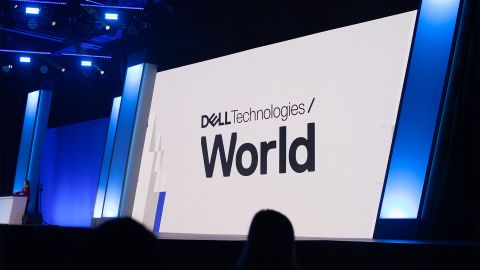
Welcome to ITPro’s live coverage of Dell Technologies World 2024. It's day two here in Las Vegas, and we've got another jam-packed day ahead of us.
It's very early here at the Venetian Resort, but we're up and getting ready for the day-two keynote. Stay tuned for all the latest news, updates, and announcements throughout the day.
Good morning from Las Vegas. The opening keynote here at Dell Technologies World is a few hours away, and due to kick off at 10am PT. We can expect to hear lots about AI and infrastructure, with a scheduled appearance from the likes of Jensen Huang, CEO at Nvidia.
Just under three hours to go until the conference kicks off with today's keynote led by Michael Dell, CEO, chairman, and founder of Dell Technologies. The floor is already buzzing with attendees here at the Venetian – along with an Elvis impersonator – and the energy is only going to increase.
AI is set to be one of the main topics of today's keynote and this is reflected in the visuals currently shown on the Las Vegas Sphere:
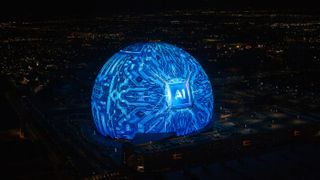
All night ahead of the conference, the Sphere has been cycling through animations related to Dell Technologies World 2024, as shown in the header image for this live blog.
Dell is in an interesting spot with regards to AI, as it's leaned heavily on its existing infrastructure and partnerships with the likes of Nvidia. It's clear that this is set to continue throughout this year's event, with Dell having announced its own AI Factory with Nvidia at this year's Nvidia GTC conference – something the company is certain to follow-up on on its home turf.
Today's keynote teases announcements that will help customers "transform your greatest ideas into action with AI, Multicloud, Edge, and more," with representatives from relevant firms such as Nvidia's Jensen Huang and Sungwoo Hwang, president and CEO at Samsung SDS joining Dell on stage to explain more.
Any further detail Dell can give on lightweight LLMs – critical to its approach of bringing AI to the edge, including potentially AI on business laptops – will be key here.
We'll be bringing you the latest news as it comes, so don't go anywhere.
We're in the keynote arena, which is filling up quickly. As is tech conference tradition, the soundtrack right now is an upbeat DJ set – the current song is a trance beat remix of Livin' on a Prayer.
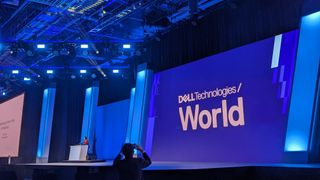
The era of AI
And we're off, beginning with a video montage recapping Dell's year in the industry leaning heavily on AI with a montage based around the phrase "Make it X" e.g. "Make it creative", "make it sustainable".
Here to run us through all of this and more is Michael Dell, founder, chairman and CEO, Dell Technologies.
"We are thrilled to bring you some of the leading voices in technology today," Dell begins, along with a promise of real customer stories. This ties into Dell's stated goal in its keynote descriptions – namely, showing the concrete benefits of AI.
Celebrating 40 years of Dell, we're told, and Dell runs us through all the advancements of the past four decades including meaningful scientific breakthroughs and all the evolutions in computer hardware we've enjoyed.
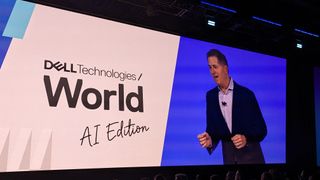
This isn't just any other Dell Technologies World – it's the 'AI edition'.
"All that progress that came before was really just the pre-game show," Dell tells us, emphasizing that the tech sector is currently experiencing a pivotal moment in its history.
Dell says we're "moving from computation to cognition, into the age of AI".
Dell says that organizations can't just look to "turn the wheel", when it comes to adopting AI. Instead, they must reinvent and innovate to transform their entire organization to make the most of it.
To hear more about AI and the work Dell is doing with its partners to harness the technology, we're now welcoming Bill McDermott, chairman and CEO, ServiceNow to the stage.
"ServiceNow is an idea, and just like how Michael Dell had his dream for Dell, I have mine for ServiceNow: to make sure it becomes the defining enterprise software company of the 21st century," says McDermott.
"Every workflow, in every industry and every corner of the world will be reinvented wirh generative AI," McDermott adds, implying that it changes our understanding of Moore's Law.
McDermott says he's currently working with the Schwarz Group, Europe's largest retailer, and notes that "one bad experience" for a customer makes them a third less likely to do business with your company ever again. AI can help here, he says, but it must also be done carefully.
"It's a mess out there, ladies and gentlemen. When you have people swivelling between 17 different applications a day, no wonder they don't want to come back to the office," he says.
"What we do is put a clean pane of glass on the mess, we become the AI platform of business transformation."
McDermott says with the right approach, organizations can achieve exponential benefits, but this will require a "human revolution" among the workforce driven by leaders.
In his closing remarks, McDermott praises Dell's cloud infrastructure which he says provides the most reliable basis for enterprise processes and feeds directly into ServiceNow's "unheard of" 99% retention rate.
"We use Dell's servers to train our large language models, and we're putting AI to work for people," he says, giving the example of conversational self-service for better customer experience.
So far, this has been a glowing 20 minutes of praise for Michael Dell, but light on announcements. But there's every indication that's about to change, with Nvidia's Jensen Huang having already been mentioned several times.
Dell's AI factories for customers
Before we get there, Dell is running us through some key stats for enterprise AI adoption. Running inference on LLMs on premises, Dell says, can be 75% more cost effective versus the public cloud. This is what Dell is looking to empower through its 'AI factory' approach, an end-to-end ecosystem for AI training, inference, and tuning.
"Data has been, and is, at the center of everything: it's the rocket fuel," he says.
"So let's go where the data is. And no company in the world has provided more data storage capacity than Dell."
On this note Dell has today announced PowerStore Prime, a new NAS storage solution for 66% improved performance through flash storage and secure snapshots for data protection.
Joining this is the PowerScale F910, described by Dell as a product that "feeds the beast of accelerated computing" with unstructured data.
The heart of today's hardware announcements, however, is the PowerEdge XE9680. Dell says its specs include:
- Eight Nvidia GPUs
- 4TB/sec throughout
- 50% more GPU direct score access
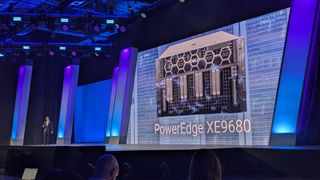
To handle all the throughput for these AI workloads, Dell has partnered with Broadcom and Nvidia for networking fabrics.
AI at the edge
Dell is keen to move onto edge computing, with a landmark five new AI PCs announced today.
"We are using an advanced architecture with a CPU, a GPU, and an NPU," in each laptop, Dell says.
Dell claims that these devices are ideal for inferencing AI models at the edge without cutting into battery life.
All of this ties into Dell's AI ecosystem, we're told, which also includes open source AI models, services around retrieval augmented generation, and connections with Azure, DataBricks, IBM, and Snowflake.
If that sounds like a flurry of sudden announcements, it is – Dell almost said it all in one breath. We've been promised more details on all that in tomorrow's keynote, which we'll also be covering live.
Leveraging AI on premises with Dell
But how does all this benefit customers? Here to give a personal example is Sungwoo Hwang president and CEO, Samsung SDS.
"Our enterprise customers are very interested in using hyperautomation using LLMs, but they're worried about security because they have to put their proprietary information into LLMs, their company's core data," Hwang says.
Hwang says Dell has helped Samsung SDS in a meaningful way by providing its customers with low-latency AI solutions that are also inherently secure, being hosted on premises through Dell infrastructure.
"Dell AI Factory is expected to contribute to the establishment of data sovreingty for companies by enabling strong data security and customized AI service deployment," Hwang adds, praising Dell for its approach.
We've heard a lot of praise for Michael Dell already, but Dell is now taking time to give credit to Dell's partners and customers across the sector.
"We are getting faster, stronger, smarter to be by your side for both a sprint and a marathon," Dell says. The demand for AI is already touching every industry and organization, Dell says, but notes that AI models will vary by use case.
LLMs, for example, can create real value as chatbots for customer service but aren't so useful in a manufacturing context. For this, other models such as vision and multimodal AI will be necessary, he adds.
Small models also have a powerful role to play, Dell adds. As predicted, we're hearing more about the smaller, edge-capable LLMs now.
'AI factories' with Dell and Nvidia
"The early movers are making massive bets," Dell says, noting that we're at the start of a new industrial revolution. But don't take it from him, he urges – take it from the man he's quoting, Jensen Huang founder and CEO, Nvidia.
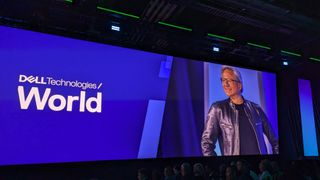
"Instead of just producing software, we're now producing intelligence, formulated in the form of tokens," Huang says. While the previous industrial revolution focused on producing software and the one before that producing electricity, he says, we're now directly manufacturing intelligence.
The bottom line here is that Dell and Nvidia are doubling down on the importance of AI. Huang underlines the importance of "generative AI factories," which can be used to totally reinvent a firm's operational model.
"Every company at its foundation is intelligence," Huang adds, noting that "every company will be an AI company".
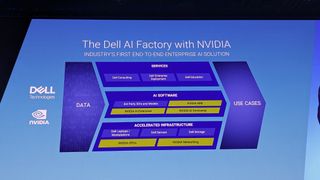
Huang describes Dell AI Factories with Nvidia as "the largest AI go-to-market in history," to applause from the audience.
"Only Dell has the ability to build computer networking, storage, integrated with incredible software whether you want it to be air-cooled, liquid-cooled," Huang adds.
All of this revolves around seven new announcements for Dell AI Factory with Nvidia, including new Nvidia NIM microservices and hardware.
At the heart of this is the Dell PowerEdge XE9680L, a new liquid-cooled server rack that can host up to 72 of Nvidia's flagship Blackwell GPUs.
"Only at Dell World do you talk sexy like that," Huang quips, prompting loud laughter throughout the auditorium. On a more serious note, Huang says the aim here is to make AI as easy as possible, even when "giant supercomputers" are necessary for running the latest AI workloads.
What does Huang say we need to do going forward?
"One: modernize a trillion dollars of the world's data centers. Two: build these AI factories, for the rest of the hundred trillion dollar industries. Easy peasy."
Moving on, Dell notes that there are clear barriers to AI adoption. For one, we need ethical AI development, and to address enterprise concerns.
Green data centers, powered by renewable energy sources and cooled more efficiently are at the core of responsibly and sustainably adopting AI, Dell says.
He also says that governments must adopt an 'AI-first' approach and that Dell stands ready to support the public sector in this aim. If we don't invest in AI, Dell says, we'll miss out on benefits for future generations.
To demonstrate this, we're now being shown a short clip about what Dell calls 'AI for human progress'. Examples include AI for healthcare and the future generations using AI to solve issues in their communities, as well as students leveraging chatbots to train for job interviews.
"We are at the dawn of a new age of cognition," Dell says, thanking his guests today. To illustrate the point and emphasize the potential AI holds for future generations, Dell is joined onstage by McDermott, Hwang, and Huang alongside younger workers representing the next generation of the sector.
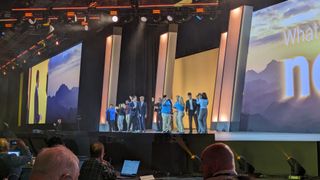
And with that, the day-one keynote is finished. Stay tuned for all the latest on the ground throughout the event.
Yesterday's opening keynote with founder and CEO, Michael Dell, set the stage for an exciting few days here in Las Vegas.
Nvidia CEO Jensen Huang made an appearance to discuss the close ties between Dell and Nvidia, and we had a couple of big announcements here regarding the 'AI Factories' work ongoing between the two firms.
New features are coming to Dell AI Factory with Nvidia. This is an end-to-end solution for enterprise AI deployment that aims to streamline the development and roll-out of AI tools.
Moving forward, Huang revealed the duo aim to forge closer ties and draw upon their combined software and hardware capabilities to further expand the service.
This includes new server options for customers that leverage Nvidia's latest chips, as well as greater support for the Nvidia AI Enterprise platform.
Updates to the AI Factory service weren't the only headline-grabbing announcements, however.
Dell is very bullish on edge computing right now, and the company is focusing heavily on bolstering its capabilities in this regard. Yesterday we saw five new AI PCs unveiled, which Dell said are finely tuned for inferencing AI models at the edge without placing significant strain on battery life or performance.
AI PCs certainly are all the rage at the moment, as Microsoft unveiled its own new Copilot+ AI PC brand at its Build conference this week.
So, what can we expect to see at the day-two keynote this morning?
Today's session is titled 'Making AI Real', so get ready for a hands-on session with speakers running us through practical, real-world examples of AI innovation.
Chief operating officer Jeff Clarke will be leading this morning's session, and he'll be joined by a host of Dell customers to give us a glimpse into how they're delivering operational improvements through AI tools.
In the meantime, why not catch up on all of our coverage from Dell Technologies World so far? There's more to come, so be sure to keep your eyes peeled for all of our rolling coverage.
• Dell doubles down on Nvidia partnership with ‘AI factories’ and models at the edge
• Dell Technologies expands AI ecosystem with Microsoft, Hugging Face support
• All our predictions for Dell Technologies World 2024 (let us know how we're doing so far...)
There's a real buzz here at the Venetian today ahead of the morning keynote and we can expect another packed conference hall ahead of things kicking off!
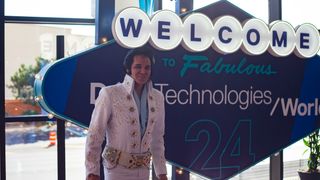
For the maximum Vegas experience, there's an Elvis impersonator on the ground near the keynote auditorium. That's probably the theatrical peak of the morning, as today's keynote will be far more technical and promises to delve deeper into some of the conference's biggest announcements.
While the auditorium quickly fills with attendees, we're being treated to a live DJ and saxophonist, while a rolling deck of quotes about AI is shown on the stage screens.
These reflect some of what we heard yesterday about restructuring your organization and what Bill McDermott, chairman and CEO at ServiceNow, said around the "human revolution" that will be necessary to harness AI in the enterprise.
"If you're curious and like to learn, there has never been a better time to be alive, to make yourself and your organization smarter and more productive," reads one from Michael Dell, CEO, chairman, and founder of Dell Technologies.
And we're off, beginning with the same video montage as yesterday, covering the potential for AI in the enterprise with the taglines "Make it your own", "Make it sustainable", etc.
Here to take us through all those and welcome special guests onto stage to discuss the real-world benefits of AI is Jeff Clarke, vice chairman and COO at Dell Technologies.
Clarke promises detail on how Dell can help with AI across the course of today's keynote.
"We're going to talk about what we blueprint, what we've learned, and how we can help you deploy AI and take advantage of this enormous technological opportunity we have today."
Before then, we're getting another macro view of what Dell calls the 'AI revolution'.
"Since we were last together," Clarke says, "it's been one hell of a year. There's been no slowing down in generative AI – in fact, I would argue that it's only accelerated."
Clarke says we've not had a breakthrough like this since the industrial revolution, as illustrated by a large graphic of a steam locomotive behind him. The raw material driving this revolution, we're told, is information and the new machines are hardware like GPUs.
AI factories to harness the 'AI revolution'
The main transformation that IT leaders will have to handle is that "AI workloads require a vastly different computing architecture". Dell believes that its AI Factory approach is the solution here.
What is an AI factory? Clarke says these are combinations of services, open ecosystems, and infrastructure that turn data into something useful, particularly when it comes to leveraging insights that were previously undiscoverable.
"We're moving from what has been, historically, a computational output to more of a cognitive response with context and reasoning."
Dell has five core beliefs related to AI:
- Data is the differential that should drive businesses, as 83% of all data is on premises and 50% is generated at the edge
- AI will move to the data and not the other way around
- There is no one-size-fits-all approach here, as AI will need to adapt from edge computing to the hyperscale
- Firms will need to use open, modular infrastructure to use AI
- The sector needs an open ecosystem to take advantage of these powerful new technologies
The Dell AI Factory comes in all shapes and sizes, Clarke says, ranging from models run on Dell's Precision workstations all the way up to a data center containing "hundreds, if not thousands of Dell PowerEdge XE9680Ls" each of which contains up to 72 Nvidia Blackwell GPUs.
"Accelerating computing is the table stakes," Clarke says, adding that Dell has a key role to play here with its ability to deploy solutions at scale and to match the performance per dollar that businesses need.
Clarke is now warning the audience about the immense compute demands AI will drive in the coming years. He says the number of flops to meet AI compute by 2027 will be measured as 27 followed by thirty zeroes.
"By 2030, only 10% of the compute demand will be for training and the rest will be for inferencing," he says. By the same date, he adds, 390 GW of additional power generation will have to come online to match AI data center demand.
That's a lot to consider, but it's time to consider all this with real-world examples. Here to explain more is Charlie Kawwas, president, Semiconductor Solutions Group at Broadcom.
"Networks in today's data centers are the bedrock of the data centers we built over the past three decades," says Kawwas.
As we move toward the true potential of AI, Kawwas says, we will need upwards of a million GPUs. He compares networking to the brains of the operation and data to the heart.
"I believe to scale up to that level, to have the brain and the heart, we will need an open ecosystem," Kawwas says,
Kawwas now shows off the new 5 nanometer, monolithic die Tomahawk 5 chip which is present within Dell's PowerEdge XE9680. Describing it as "unique," Kawwas explains that it delivers the lowest latency while also achieving excellent energy efficiency for lower running costs.
The chip works hand in hand with Broadcom's new NIC ethernet switch, which delivers 400GB/sec bandwidth.
"We, all of us, are very lucky to be living in this inflection point," Kawwas adds. Over the next three years, he says, we'll see more power and performance from "bigger, meaner GPUs".
"On the front-end networking, it's going to stay Ethernet which isn't going to change – if anything, it'll get faster," Kawwas projects, noting that speeds of 800Gbits/sec or 1.2Tbits/sec are achievable. He also says that while the new PowerEdge server uses PCIe generation five, by next year we'll already be on generation seven.
Lots of detail here, with a show-and-tell from Kawwas as he brings hardware onto the stage to show the work Broadcom is doing in collaboration with Dell. He's now showing off a new chip, which through four chips co-packaged with the Tomahawk 5, replaces the need for 400 native transceivers, which can cut power draw by as much as 70%.

Overhauling infrastructure
Having taken in some fabric advances, Clarke says we're now moving onto Dell Infrastructure Solutions Group (ISG). Here to run us through all of this is Arthur Lewis, president, Infrastructure Solutions Group at Dell Technologies.
"With our AI Factory, we sit at the very center of the AI revolution," Lewis says, segueing into some of the specific compute advances made at Dell Technologies World 2024.
Focusing on the XE9680L, Lewis says he's incredibly excited by the potential of the new liquid-cooled hardware solution.
"Leveraging our decades-long leadership in liquid cooling, we have improved the energy efficiency of the XE9680L 2.5x," Lewis says. He notes that the 12 PCIe slots on offer support 400Gbits/sec ethernet, which is a market-leading level of throughput.
It doesn't stop there, Lewis says. Dell has also revealed a number of rack-scale solutions for the XE9680L, including the 100KW design shown off in yesterday's keynote that can support up to 72 Nvidia Blackwell 200 GPUs.
With one eye on the horizon, Dell has also unveiled a rack solution for the Grace Blackwell 200 superchip, along with the x86 innovations from Intel.
Paying credit to Broadcom with its Tomahawk 5 and Thor 2 hardware offerings, Lewis says this will help Dell meet the 300x increase in data throughput demand driven by AI workloads.
Moving swiftly onto hardware, Lewis emphasizes the capabilities of the new PowerScale F910, Dell's flash storage NAS solution for leveraging data at the speed and scale needed for AI performance. It comes complete with PCIe generation five, as well as 24 NVMe SSDs.
Next year, we're told, Dell will unveil Project Lightning, a new parallel file system for unstructured data which will deliver 18.5x more throughput and 20x more performance compared to competition.
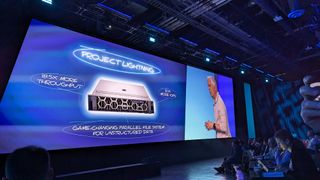
Lewis says an open ecosystem is at the top of customer demands, as businesses want flexibility on how and where they run models.
Dell is working on this with its partners and to tell us more about this, we're now welcoming Ihab Tarazi, SVP and CTO, AI and Compute, Infrastructure Solutions Group at Dell Technologies, to explain more.
Noting that open source innovation is key in the AI space, Tarazi has also welcomed Sy Choudhury, director, AI partnerships at Meta to the stage.
Speaking on the release of Meta's open LLM Llama 3, Choudhury says that Meta seeks to democratize the AI market as "that helps all of us". This applies especially to safety benchmarks, he says, as the community can collaborate on finding errors and unwanted outputs.
Choudhury also highlights the "very permissive" licence for Llama 3, which he says lets businesses use it how they want and to fine-tune it on their own data.
Tarazi asks Choudhury what the numbers associated with Llama 3, such as being trained on 15 trillion tokens or its 8,000 token context window, means for users.
"Compared to a year ago, you're seeing better reasoning, more accurate responses, better multi-term conversations, and frankly better coding abilities," Choudhury responds.
Choudhury says there's a great deal of flexibility in deploying Llama 3, from fine-tuning to the more advanced use of vector data for retrieval augmented generation (RAG), which can help tailor responses to a company's data and identity without having to shift data around.
"As you're building your AI Factory, along with Dell and other partners, you're able to have your data and your model in your AI Factory," Choudhury says.
We're moving swiftly on, discussing open models in a broader sense. With this in mind, Tarazi is now welcoming Jeff Boudier, head of product at Hugging Face, to the stage.
Hugging Face now hosts over one million models, Boudier says, all of which enterprises can "truly own and host themselves in their own secure environments, without compromising customer data".
One of the biggest hurdles to AI adoption is getting models from a repository to an on premises production deployment, as IT teams have to deal with comntainers and quantization.
To address this issue, Dell has partnered with Hugging Face on Dell Enterprise Hub, a new portal on Hugging Face for easy deployment of models in the form of ready-to-use containers.
To illustrate how easy the solution is to use, we're being shown a demo in which a Dell Enterprise Hub user browses a catalog of models on the portal. Each model card represents a container with a model pre-optimized for Dell hardware and users can filter by the specific hardware they use or even by model licence type.
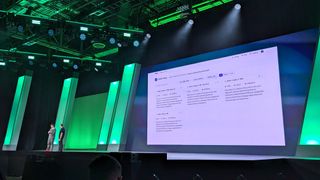
"This only takes a few clicks," says Tarazi.
Dell's focus on AI PCs
More on Dell's AI PCs now, with the firm having rolled out NPU-driven AI support across its portfolio including its XPS, Latitude, and Precision lines. Here to explain more is Sam Burd, president, Client Solutions Group at Dell Technologies, along with Dounia Senawi chief commercial officer at Deloitte Consulting LLP, to give an example of how AI PCs are already being used.
Senawi says there's great porential for AI to be run at the edge on individual devices:
"We see this as the future and we really want to lead."
Deloitte has used AI PCs to empower its developers with on-device code completion using the Llama 7B lightweight model. "We saw great additional results in process and quality speed, productivity, reduced errors, and improved privacy and security," says Senawi.
We're moving along quickly once again, as Burd thanks Senawi and reminds us that Dell unveiled five AI PCs in yesterday’s PCs. Each comes with the new Copilot Key for launcing Microsoft Copilot.
Here to explain more when it comes to Copilot on PCs is Matt Barlow, corporate VP, Windows Marketing at Microsoft.
“Finding things on PC is really difficult,” says Barlow, explaining how Microsoft’s ‘Recall’ feature which logs user activity for AI recollection can help users be more productive. He gives the example of using Recall to find his flight itinerary and even finding a specific slide within a deck.
The speed of AI with McLaren Racing
Clarke is now back on stage and promises that althoigh the keynote has run a little overtime – for those who are counting – "we're saving the best till last".
I've written "we're moving along quickly" a few times in today's live blog already, but here it becomes literal as we welcome Zak Brown, CEO at McLaren Racing to the stage.

"We have a factory to make the race car and we have an AI factory that helps us
Brown explains that the world of racing is measured in "the smallest of margins," with 2.6% separating the best from the worst. Each racing weekend, McLaren runs around 500 race simulations, powered by Dell infrastructure, with sensors on the car feeding millions of data points to McLaren's compute.
"Everything points to performance, whether that's our HR, our marketing team, our commercial department, because there's now a cost cap in F1 so where we used to be able to spend our way out of a problem we now have to be unbelievably efficient with everything we do."
McLaren is already working on its 2026 car, which Brown says will be its most "AI-driven" car ever.
An AI 'blueprint' across Dell's AI Factory approach
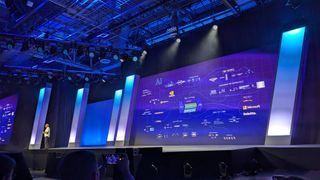
To round off, we're zooming out – way out – with an expansive blueprint of all the announcements made at this year's event.
"The entire discussion has been a blueprint of how we make AI Factories an extension of our partnerships, open and modular infrastructure to build AI systems and solutions for all of you," Clarke says.
"It's about Dell AI Factory making it easy for you."
And with that, we're finished with the day-two keynote at Dell Technologies World 2024. Keep an eye on ITPro as we continue to bring you the latest from the conference, including in-depth analysis of the announcements.
